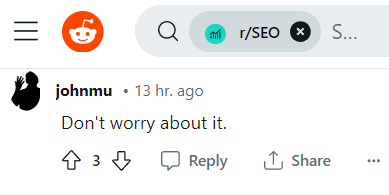John Mueller posted an affirmation of a Redditor’s deconstruction of the commonly used SEO phrase Topical Authority, which demystified what topical authority for SEO is really about.
Reddit Discussion On Topical Authority
The discussion opened with a post by someone whose boss told them they didn’t understand the concept of topical authority.
They posted:
“My understanding is you didn’t understand anything about Topical Authority & Knowledge Graph. I was told this by my manager.
Please help me understand it if you have any examples.
I’ve gone through YouTube videos but couldn’t find any relevant material.”
Someone with the Reddit nick GrumpySEOguy responded:
“‘Topical Authority’ is a new fancy term used by SEO ‘gurus’ to get clicks.
This concept has been around as long as I can remember and is actually called “relevancy.”
– relevancy answers the question of “does my website enter into the possibility of being in the results for a certain search term?’
– authority answers the question of ‘WHERE’ does my website rank in the results during a search for a certain search term”
What GrumpySEOguy means is that relevance and authority basically mean the same thing.
And they also affirm that a site that ranks higher for a search query is authoritative (more relevant) for that search query.
GrumpySEOguy followed up with:
“In other words, your boss has been watching too many YouTube videos by SEO gurus and probably doesn’t understand relevancy, either.”
John Mueller responded by posting:
“This”
He later followed up by saying they shouldn’t worry about topical authority.
Screenshot Of Mueller Advising To Not Worry About Topical Authority

Everything Old Is New Again (And Again)
There’s a trend with relatively newbie SEO gurus where they rename something that already existed then put it out there as if it’s new.
Even the trend of renaming old tactics to pass them off as new is not new, it’s been going on for decades.
For example, the 10x content building tactic from 2015 was about creating content that is ten times better than existing content in order to make it better positioned to obtain links (because it’s ten times better than what’s currently ranking).
A few years later came the Skyscraper content building tactic that was similar but worse. The Skyscraper tactic advised newbie SEOs to make content that is longer, as if making the content longer was a way to make content better. The Skyscraper content also said out loud what the 10x strategy did not: It advised SEOs to copy what the competitors are doing but rewrite it better and then to poach the competitor’s links.
Let’s put both of those tactics into a box and set them out on the curb:
Both tactics are silly because the underlying advice in 10x and Skyscraper is to create content that’s better than your competitor’s.
Duh… right? It’s like giving breathing a trendy name and calling it a strategy for extending your life.
Does slapping a name on an activity that’s common sense even qualify as a tactic?
Topical Authority
Topical authority is an SEO term that was extrapolated from different concepts about authoritativeness that are used at Google.
Yes, Google looks for signs of authoritativeness, this is a fact.
And it’s true that Google will analyze a website or a section of it to determine if the site or section of it are relevant for a topic.
The SEO concept of Topical Authority takes those facts and creates an alternate reality that posits that creating content focused on a topic and linking them all together will cause Google to see it as authoritative for that topic.
But, that extra bit about linking related articles to each other in order to make Google give it a topical authority merit badge has no basis in reality.
Taking a bunch of related content and linking them all together based on their relevance to each other is a common sense best practice.
- But does doing that make mediocre content more authoritative?
- Does doing the same thing for good quality content make it more authoritative?
Good content is authoritative because it’s good content that is relevant to user queries.
The ideas about “topical authority” are similar to the ideas about skyscraper and 10x content: they’re labels slapped on top of longstanding best practices that are also common sense.
Now let’s take a thinking person’s look at the concept of Topical Authority:
Creating a lot of good content on a topic that’s important to your audience and conveniently organizing it within the website within a category is not just best practice, it’s common sense.
The common sense idea of creating a lot of good content focused on a popular topic then organizing it so it’s easy for users to find is common sense, it’s not a content strategy.
And people were doing that for a long, long time, way before some newbie SEO guru slapped the label of Topical Authority on it.
The term “topical authority” was simply layered on top of a set of best practices related to good site architecture (organization of content within a site).
Google looks for signals of authoritativeness but there is no actual “authority” score at Google and Google doesn’t add the label Topical Authority on content that’s grouped together by topic.
It’s fine to say that a site has topical authority because it ranks well. But it gets iffy once people start talking about it as if it’s a revolutionary tactic (it’s not, it’s just common sense).
As Google’s John Mueller said,
“Don’t worry about it.”





![AI Overviews: We Reverse-Engineered Them So You Don't Have To [+ What You Need To Do Next]](https://www.searchenginejournal.com/wp-content/uploads/2025/04/sidebar1x-455.png)